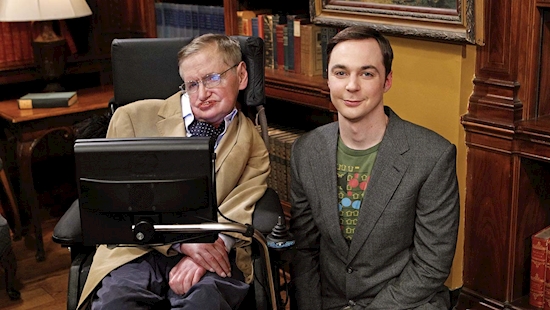Hollywood Flashback: Stephen Hawking Guest-Starred on 'Big Bang Theory' in 2012
The famed physicist was often in voiceovers, in seven episodes, for the CBS comedy, with his most substantial appearance in the Season five episode, "The Hawking Excitation," as creator Chuck Lorre reveals how Hawking prepared for his role.
In the long history of TV guest stars, there was never a cameo by someone smarter than Stephen Hawking. And the physicist did quite a few of them.
In 1993, he appeared on a Star Trek: The Next Generation episode playing poker with Data, Albert Einstein and Isaac Newton. (Hawking, holding four sevens, crushes Einstein.) As an animated character, he did four episodes of The Simpsons (the program he called "the best show on American television") and in one decides to steal Homer's "donut-shaped universe" idea.
After his death in 2018 at 76, The Hollywood Reporter quoted showrunner Al Jean as saying the only limitation Hawking placed on his appearance was "he did not want to be drunk onscreen. That was the only note we got from him. He didn't mind having a beer with Homer at Moe's, but not more." In many ways, the most natural TV fit for Hawking was with CBS' The Big Bang Theory, a sitcom with physics nerds at its center. He was part of the plot, often in voiceovers, in seven episodes. His most substantial appearance was on a 2012 show called "The Hawking Excitation." The story has him coming to Pasadena to lecture at Caltech. Jim Parsons' character, Sheldon, who modestly believes Hawking is "perhaps my only intellectual equal," jumps through hoops to meet the physicist and gets him to read the thesis that "came to me one morning in the shower" on the Higgs boson particle.
"You clearly have a brilliant mind," Hawking declares before delivering the bad news: "Too bad it's wrong. You made an arithmetic mistake on page two. It was quite a boner." When Sheldon collapses, Hawking says, "Great, another fainter." Says Big Bang creator Chuck Lorre: "All of professor Hawking's dialogue was preprogrammed and triggered through a voice synthesizer. When we offered to do that, we were told he preferred to program and trigger his lines by himself. He wanted to 'act.' "
This story first appeared in a June stand-alone issue of The Hollywood Reporter magazine. To receive the magazine, click here to subscribe.
Source: www.hollywoodreporter.com

